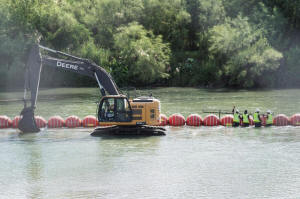U.S. judge orders Texas to move Rio Grande barriers to embankment,
siding with Biden
 Send a link to a friend
Send a link to a friend
 [September 07, 2023]
By Ted Hesson [September 07, 2023]
By Ted Hesson
WASHINGTON (Reuters) -A U.S. judge ordered Texas to move floating buoys
that were placed in the middle of the Rio Grande to block migrants from
illegally crossing the U.S.-Mexico border, a tentative win for President
Joe Biden, whose administration sued the state.
U.S. District Court Judge David Ezra on Wednesday issued a preliminary
injunction in Austin that requires Texas to relocate the buoys,
currently near the city of Eagle Pass, to an embankment on the Texas
side of the river by Sept. 15. The Biden administration argued in a
legal challenge that the 1,000-foot (305-meter) barrier illegally
disrupts navigation and was installed without permission from the U.S.
Army Corps of Engineers.
The ruling is a setback for Texas Governor Greg Abbott, a Republican who
contends that Biden, a Democrat, has been too lenient with border
security as record numbers of migrants have been caught crossing
illegally in recent years.
The floating barrier is one of multiple strategies Abbott has launched
to deter migrants, including coils of razor wire placed along the
riverbank.

"Governor Abbott announced that he was not 'asking for permission' for
Operation Lone Star, the anti-immigration program under which Texas
constructed the floating barrier," Ezra wrote in a 42-page order.
"Unfortunately for Texas, permission is exactly what federal law
requires before installing obstructions in the nation's navigable
waters."
Texas immediately appealed the ruling to the conservative-leaning 5th
U.S. Circuit Court of Appeals and Abbott's office said it was willing to
take the case to the Supreme Court if needed.

"Our battle to defend Texas' sovereign authority to protect lives from
the chaos caused by President Biden's open border policies has only
begun," the governor's office said in a statement.
The U.S. Justice Department is pleased with Ezra's ruling, Associate
Attorney General Vanita Gupta said in a statement.
[to top of second column]
|

Workers install connected buoys, a measure by Texas authorities in
an attempt to deter migrants from crossing the border, in the Rio
Grande in Eagle Pass, Texas, U.S. July 24, 2023. REUTERS/Go Nakamura

Mexico's government also issued a statement, saying it remained
attentive for the final resolution, reiterating the "urgency of
permanently removing the buoys on our shared border" and the need to
safeguard migrants' human rights.
Abbott's border operations came under increased scrutiny in July
after an internal trooper email surfaced alleging that Texas
authorities had been ordered to push migrant children back into the
river and deny water to migrants in extreme heat.
Weeks later, a dead body was found stuck in the buoys. The Texas
Department of Public Safety said the victim appeared to have drifted
into the barrier after drowning.
Ezra, an appointee of Republican former President Ronald Reagan,
said more than 140 concrete anchors - some weighing 3,000 pounds
(1,361 kg) - used to secure the buoys could cause serious damage to
boats or other vessels.
"Photographs show these grey concrete anchors standing from the bed
of the river, with no markings to identify them as hazards," Ezra
wrote. "These concrete obstacles present a serious risk to
watercraft of any kind."
The Mexican government sent a diplomatic letter to the U.S. in June
opposing the barrier, saying it violates a water treaty between the
two nations and may encroach on Mexican territory.
Ezra said the buoys have "already placed tremendous strain on the
U.S.-Mexico relationship," citing the tensions as an example of harm
the barrier could cause if left in place as litigation proceeds.
(Reporting by Ted Hesson in Washington; additional reporting by Aida
Pelaez-Fernandez; editing by Bill Berkrot and Stephen Coates)
[© 2023 Thomson Reuters. All rights
reserved.]This material may not be published,
broadcast, rewritten or redistributed.
Thompson Reuters is solely responsible for this content. |